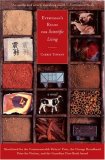Summary | Excerpt | Reviews | Beyond the Book | Readalikes | Genres & Themes | Author Bio

A Novel
by Carrie TiffanyChapter One: The Better-Farming Train Brings Science to the Man-on-the-Land
1934
There are days of slow chugging through the wheat. I look out the window at
the engine as it rounds a bend. Living on a train is like living inside the body
of a snake. We are always leaning into the curves, always looking forwards, or
backwards, never around. Here we are arriving at some tiny siding, just a few
neat-edged buildings and their sharp shadows. Here we are again, a few days
later, pulling away, all of us craning out the windows, gazing down the long
canyon of railway line.
Sometimes a grateful farmer, or his son, will run a length beside us, waving
his hat and grinning and calling out, "Three cheers for the Better-Farming
Train," as if we are going to war. In those few days at Balliang East or Spargo
Creek or Bendigo we make a place like somewhere else. Somewhere new.
The children say, "Look, a circus, look at the tent, look at the animals."
Time moves differently around us. Our lecturettes, illustrated with lantern
slides, show the same farmer, time after time, about his chores. There he is,
before breakfast, caring for his dairy herd in the wet hills of Mirboo North. A
row of Eaglehawk graziers watches him closely and they bray with disbelief at
the lush green of the pasture, although the slide is in black and white.
"Again," the men say. "We want to see it again."
We bring to each town new sizes and shapes and colors. Beasts broader than
they are high; cows with giant dangling udders whose teats brush the ground like
the fingers of a glove; fleece-laden sheep like walking muffs; wheat grown so
high by colorless chemicals it reaches the waist of the tallest man. Our fruits
and vegetables on display are large and smooth and perfectly formed. They gleam,
inviting touch, and give off a sweet, waxy aroma.
The women's car is at the end. Fourteen cars of stock and science and produce
and then us, a shiny afterthought: infant welfare, cookery, and home sciences.
My colleagues -- Sister Crock, head of "women's subjects," and Mary Maloney,
lecturer in cooking -- complain about our position. Or rather Sister Crock
complains. She says it is a question of cinders. When the train turns a corner
cinders blow back through our windows into our kitchen, onto my dressmaking
dummies, dressed and swaying.
Mary Maloney and I smirk. Because she raises this complaint in the Mallee,
where we chug along for days, as if drugged, pushing through the endless wheat.
There are no corners, no hills, no ridges, no edges to anything. At the Minyip
siding I notice that the men of the wheat districts are straight-backed and
stiff-necked. Many seem dazed at the sight of us. They are men with no
experience of corners.
The cinders are not the real reason Sister Crock complains. Being at the end
means that when we have finished our lectures at one town and packed up to
travel to the next, we must walk through all the agricultural cars to the
sitting car up front. Sister Crock says when a lady travels she must be seated.
She says, "Oh lordy, lordy," clapping a white handkerchief to her nose in the
pig car.
Each car is a tunnel of smell. The air moves in through open slats, across
the beasts, across us walking up the aisles, and then mixes together behind the
train into a heady, steamy cloud. Only the animals grazing in the paddocks as we
pass can unmingle the odors and reply in loud yearning to a juicy cow or the
sharp piss of a colt in his prime.
We jam Sister Crock between us. Mary is on shit alert. She says, "Jump now,
Sister," as a huge Border Leicester ram aims a clod of pellets in front of us.
They fall like marbles and we hop about on our toes to avoid them. Sister Crock
shakes her head. We have an effect on the animals. It's not just the shit; they
moo and bah and grunt and bellow at us, even after we've gone, but perhaps a
little more forlornly.
Copyright © 2005 by Carrie Tiffany
Your guide toexceptional books
BookBrowse seeks out and recommends the best in contemporary fiction and nonfiction—books that not only engage and entertain but also deepen our understanding of ourselves and the world around us.